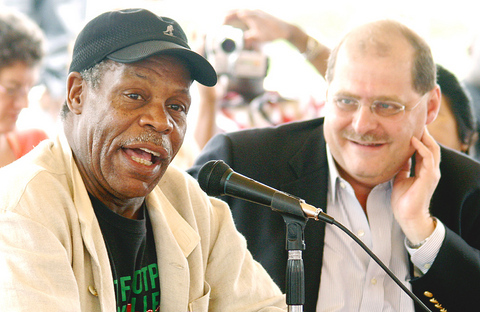Venezuela said on Friday it will expand a program to provide cheap home heating oil to poor US citizens, bringing savings to low-income families in Vermont and Rhode Island, as well as four Indian tribes in Maine.
Venezuela's Citgo Petroleum Corp. has already begun selling millions of liters of discounted fuel in Massachusetts and the Bronx in New York City as part of a plan by Venezuelan President Hugo Chavez to aid poor communities that he says are neglected by Washington.
Bernardo Alvarez, Venezuela's ambassador to the US, said he will sign an agreement on Thursday in Maine to start providing heating oil to four Indian tribes -- the Penobscot, Micmac, Passamaquoddy, and the Houlton Band of Maliseet Indians.

PHOTO: AP
"The Penobscot Nation is very grateful," tribal chief James Sappier said by phone from the reservation near Bangor, Maine. "This is probably one of the greatest decisions for our tribe in years."
Many in the tribe of 2,261 people are facing tough times economically as jobs have moved out of the area, and the discounted fuel could save a family US$1,000 or more this winter, he said.
Sappier said heating oil prices have been hovering around US$2.40 in the area recently, and Venezuela estimates participants in will save US$0.15-US$0.20 cents per liter.
Alvarez said Venezuela also will extend the deal next week to Vermont and Rhode Island. Other communities in New York City -- Harlem, Queens and Brooklyn -- will soon begin benefiting, he said.
Chavez's opponents accuse him of using Venezuela's oil wealth to win friends while trying to embarrass US President George W. Bush, whom he calls a "madman." But Chavez's supporters defend the heating oil program an example of generosity by a president leading a socialist revolution for the poor.
Alvarez was accompanied by a group of US activists on a tour of a state-funded cooperative in Caracas where the poor receive free health care and hundreds work in textile and shoemaking shops.
The visitors included singer Harry Belafonte, actor Danny Glover, Princeton University scholar Cornel West and farm worker advocate Dolores Huerta.
"It was impressive for everyone to see that progress is being made," said Tavis Smiley, who joined the group and hosts a talk show on PBS television.
Belafonte, who has praised the heating oil program, said the group came to learn about the situation in Venezuela. He was sharply critical of the situation in the US, noting poverty and a huge prison population.
West, a professor of religion, spoke admiringly of Chavez's programs, saying they show "this revolution is real; it's not something that people are just talking about."
Meanwhile, Sappier said snow was falling in Maine, and his tribe was grateful for Chavez's help.

‘TERRORIST ATTACK’: The convoy of Brigadier General Hamdi Shukri resulted in the ‘martyrdom of five of our armed forces,’ the Presidential Leadership Council said A blast targeting the convoy of a Saudi Arabian-backed armed group killed five in Yemen’s southern city of Aden and injured the commander of the government-allied unit, officials said on Wednesday. “The treacherous terrorist attack targeting the convoy of Brigadier General Hamdi Shukri, commander of the Second Giants Brigade, resulted in the martyrdom of five of our armed forces heroes and the injury of three others,” Yemen’s Saudi Arabia-backed Presidential Leadership Council said in a statement published by Yemeni news agency Saba. A security source told reporters that a car bomb on the side of the road in the Ja’awla area in

PRECARIOUS RELATIONS: Commentators in Saudi Arabia accuse the UAE of growing too bold, backing forces at odds with Saudi interests in various conflicts A Saudi Arabian media campaign targeting the United Arab Emirates (UAE) has deepened the Gulf’s worst row in years, stoking fears of a damaging fall-out in the financial heart of the Middle East. Fiery accusations of rights abuses and betrayal have circulated for weeks in state-run and social media after a brief conflict in Yemen, where Saudi airstrikes quelled an offensive by UAE-backed separatists. The United Arab Emirates is “investing in chaos and supporting secessionists” from Libya to Yemen and the Horn of Africa, Saudi Arabia’s al-Ekhbariya TV charged in a report this week. Such invective has been unheard of

US President Donald Trump on Saturday warned Canada that if it concludes a trade deal with China, he would impose a 100 percent tariff on all goods coming over the border. Relations between the US and its northern neighbor have been rocky since Trump returned to the White House a year ago, with spats over trade and Canadian Prime Minister Mark Carney decrying a “rupture” in the US-led global order. During a visit to Beijing earlier this month, Carney hailed a “new strategic partnership” with China that resulted in a “preliminary, but landmark trade agreement” to reduce tariffs — but

SCAM CLAMPDOWN: About 130 South Korean scam suspects have been sent home since October last year, and 60 more are still waiting for repatriation Dozens of South Koreans allegedly involved in online scams in Cambodia were yesterday returned to South Korea to face investigations in what was the largest group repatriation of Korean criminal suspects from abroad. The 73 South Korean suspects allegedly scammed fellow Koreans out of 48.6 billion won (US$33 million), South Korea said. Upon arrival in South Korea’s Incheon International Airport aboard a chartered plane, the suspects — 65 men and eight women — were sent to police stations. Local TV footage showed the suspects, in handcuffs and wearing masks, being escorted by police officers and boarding buses. They were among about 260 South